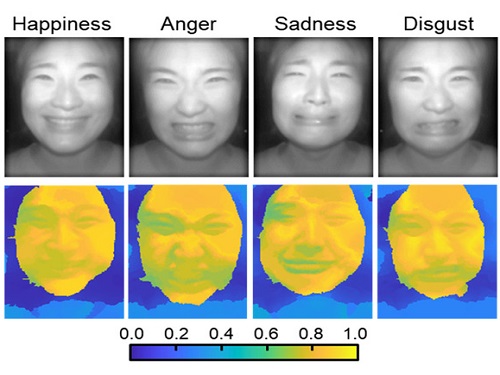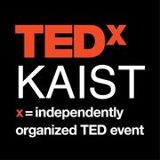reading
-
 AI Light-Field Camera Reads 3D Facial Expressions
Machine-learned, light-field camera reads facial expressions from high-contrast illumination invariant 3D facial images
A joint research team led by Professors Ki-Hun Jeong and Doheon Lee from the KAIST Department of Bio and Brain Engineering reported the development of a technique for facial expression detection by merging near-infrared light-field camera techniques with artificial intelligence (AI) technology.
Unlike a conventional camera, the light-field camera contains micro-lens arrays in front of the image sensor, which makes the camera small enough to fit into a smart phone, while allowing it to acquire the spatial and directional information of the light with a single shot. The technique has received attention as it can reconstruct images in a variety of ways including multi-views, refocusing, and 3D image acquisition, giving rise to many potential applications.
However, the optical crosstalk between shadows caused by external light sources in the environment and the micro-lens has limited existing light-field cameras from being able to provide accurate image contrast and 3D reconstruction.
The joint research team applied a vertical-cavity surface-emitting laser (VCSEL) in the near-IR range to stabilize the accuracy of 3D image reconstruction that previously depended on environmental light. When an external light source is shone on a face at 0-, 30-, and 60-degree angles, the light field camera reduces 54% of image reconstruction errors. Additionally, by inserting a light-absorbing layer for visible and near-IR wavelengths between the micro-lens arrays, the team could minimize optical crosstalk while increasing the image contrast by 2.1 times.
Through this technique, the team could overcome the limitations of existing light-field cameras and was able to develop their NIR-based light-field camera (NIR-LFC), optimized for the 3D image reconstruction of facial expressions. Using the NIR-LFC, the team acquired high-quality 3D reconstruction images of facial expressions expressing various emotions regardless of the lighting conditions of the surrounding environment.
The facial expressions in the acquired 3D images were distinguished through machine learning with an average of 85% accuracy – a statistically significant figure compared to when 2D images were used. Furthermore, by calculating the interdependency of distance information that varies with facial expression in 3D images, the team could identify the information a light-field camera utilizes to distinguish human expressions.
Professor Ki-Hun Jeong said, “The sub-miniature light-field camera developed by the research team has the potential to become the new platform to quantitatively analyze the facial expressions and emotions of humans.” To highlight the significance of this research, he added, “It could be applied in various fields including mobile healthcare, field diagnosis, social cognition, and human-machine interactions.”
This research was published in Advanced Intelligent Systems online on December 16, under the title, “Machine-Learned Light-field Camera that Reads Facial Expression from High-Contrast and Illumination Invariant 3D Facial Images.” This research was funded by the Ministry of Science and ICT and the Ministry of Trade, Industry and Energy.
-Publication“Machine-learned light-field camera that reads fascial expression from high-contrast and illumination invariant 3D facial images,” Sang-In Bae, Sangyeon Lee, Jae-Myeong Kwon, Hyun-Kyung Kim. Kyung-Won Jang, Doheon Lee, Ki-Hun Jeong, Advanced Intelligent Systems, December 16, 2021 (doi.org/10.1002/aisy.202100182)
ProfileProfessor Ki-Hun JeongBiophotonic LaboratoryDepartment of Bio and Brain EngineeringKAIST
Professor Doheon LeeDepartment of Bio and Brain EngineeringKAIST
2022.01.21 View 13151
AI Light-Field Camera Reads 3D Facial Expressions
Machine-learned, light-field camera reads facial expressions from high-contrast illumination invariant 3D facial images
A joint research team led by Professors Ki-Hun Jeong and Doheon Lee from the KAIST Department of Bio and Brain Engineering reported the development of a technique for facial expression detection by merging near-infrared light-field camera techniques with artificial intelligence (AI) technology.
Unlike a conventional camera, the light-field camera contains micro-lens arrays in front of the image sensor, which makes the camera small enough to fit into a smart phone, while allowing it to acquire the spatial and directional information of the light with a single shot. The technique has received attention as it can reconstruct images in a variety of ways including multi-views, refocusing, and 3D image acquisition, giving rise to many potential applications.
However, the optical crosstalk between shadows caused by external light sources in the environment and the micro-lens has limited existing light-field cameras from being able to provide accurate image contrast and 3D reconstruction.
The joint research team applied a vertical-cavity surface-emitting laser (VCSEL) in the near-IR range to stabilize the accuracy of 3D image reconstruction that previously depended on environmental light. When an external light source is shone on a face at 0-, 30-, and 60-degree angles, the light field camera reduces 54% of image reconstruction errors. Additionally, by inserting a light-absorbing layer for visible and near-IR wavelengths between the micro-lens arrays, the team could minimize optical crosstalk while increasing the image contrast by 2.1 times.
Through this technique, the team could overcome the limitations of existing light-field cameras and was able to develop their NIR-based light-field camera (NIR-LFC), optimized for the 3D image reconstruction of facial expressions. Using the NIR-LFC, the team acquired high-quality 3D reconstruction images of facial expressions expressing various emotions regardless of the lighting conditions of the surrounding environment.
The facial expressions in the acquired 3D images were distinguished through machine learning with an average of 85% accuracy – a statistically significant figure compared to when 2D images were used. Furthermore, by calculating the interdependency of distance information that varies with facial expression in 3D images, the team could identify the information a light-field camera utilizes to distinguish human expressions.
Professor Ki-Hun Jeong said, “The sub-miniature light-field camera developed by the research team has the potential to become the new platform to quantitatively analyze the facial expressions and emotions of humans.” To highlight the significance of this research, he added, “It could be applied in various fields including mobile healthcare, field diagnosis, social cognition, and human-machine interactions.”
This research was published in Advanced Intelligent Systems online on December 16, under the title, “Machine-Learned Light-field Camera that Reads Facial Expression from High-Contrast and Illumination Invariant 3D Facial Images.” This research was funded by the Ministry of Science and ICT and the Ministry of Trade, Industry and Energy.
-Publication“Machine-learned light-field camera that reads fascial expression from high-contrast and illumination invariant 3D facial images,” Sang-In Bae, Sangyeon Lee, Jae-Myeong Kwon, Hyun-Kyung Kim. Kyung-Won Jang, Doheon Lee, Ki-Hun Jeong, Advanced Intelligent Systems, December 16, 2021 (doi.org/10.1002/aisy.202100182)
ProfileProfessor Ki-Hun JeongBiophotonic LaboratoryDepartment of Bio and Brain EngineeringKAIST
Professor Doheon LeeDepartment of Bio and Brain EngineeringKAIST
2022.01.21 View 13151 -
 6th TEDxKAIST Held on May 11, 2013
The sixth TEDxKAIST (https://www.facebook.com/TEDxKAIST?fref=ts) took place on May 11, 2013. The event was held under the theme, “Choice between Birth and Death,” and the slogan, “B-C-D,” which was inspired from Jean Paul Satre’s quote, “Life is a choice between birth and death.”
The following speakers gave talks on the choices they have made and the impacts on their lives: Sonya S. Kwak, Professor of the Industrial Design Department at Ehwa Women’s University; Meoung-Seok Oh, a college student majoring in dental technology and business at Korea University; SooA Yeo, CEO of “Chalk,” a social venture company that offers talent donations; and Jeong-Won Lee, a senior researcher at Medical Imaging Laboratory, Electronics and Telecommunications Research Institute (ETRI).
According to the speakers, every day we make decisions, and these decisions affect not only our own lives, but also our society as a whole. Speakers and participants explored the underlying relations between the choices being made and the outcome resulted therefrom. Attendees also shared their experiences and ideas that helped them to make the right decision and stressed the importance of choices we make in our lives.
TEDxKAIST is an event operating under the official license of TED to hold TEDx programs based on TED’s slogan “Ideas Worth Spreading.” Since the first event took place under the theme “Science for Happiness, Happiness for Science” on September 2010, TEDxKAIST has brought together over 300 participants through five successful events.
2013.05.31 View 8550
6th TEDxKAIST Held on May 11, 2013
The sixth TEDxKAIST (https://www.facebook.com/TEDxKAIST?fref=ts) took place on May 11, 2013. The event was held under the theme, “Choice between Birth and Death,” and the slogan, “B-C-D,” which was inspired from Jean Paul Satre’s quote, “Life is a choice between birth and death.”
The following speakers gave talks on the choices they have made and the impacts on their lives: Sonya S. Kwak, Professor of the Industrial Design Department at Ehwa Women’s University; Meoung-Seok Oh, a college student majoring in dental technology and business at Korea University; SooA Yeo, CEO of “Chalk,” a social venture company that offers talent donations; and Jeong-Won Lee, a senior researcher at Medical Imaging Laboratory, Electronics and Telecommunications Research Institute (ETRI).
According to the speakers, every day we make decisions, and these decisions affect not only our own lives, but also our society as a whole. Speakers and participants explored the underlying relations between the choices being made and the outcome resulted therefrom. Attendees also shared their experiences and ideas that helped them to make the right decision and stressed the importance of choices we make in our lives.
TEDxKAIST is an event operating under the official license of TED to hold TEDx programs based on TED’s slogan “Ideas Worth Spreading.” Since the first event took place under the theme “Science for Happiness, Happiness for Science” on September 2010, TEDxKAIST has brought together over 300 participants through five successful events.
2013.05.31 View 8550 -
 The Atlantic, 10 Essential Books for Thought-Provoking Summer Reading, May 31, 2011
The Atlantic, a reputable monthly magazine published in the US, has released a list of summer reading that includes a cross-disciplinary selection of the 10 most interesting, though-provoking books to read. For the list and a brief introduction about each book, please visit the website below:
http://www.theatlantic.com/life/print/2011/05/10-essential-books-for-thought-provoking-summer-reading/239657/
2011.06.01 View 8726
The Atlantic, 10 Essential Books for Thought-Provoking Summer Reading, May 31, 2011
The Atlantic, a reputable monthly magazine published in the US, has released a list of summer reading that includes a cross-disciplinary selection of the 10 most interesting, though-provoking books to read. For the list and a brief introduction about each book, please visit the website below:
http://www.theatlantic.com/life/print/2011/05/10-essential-books-for-thought-provoking-summer-reading/239657/
2011.06.01 View 8726